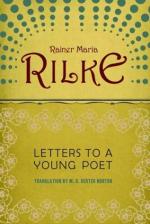
|
| Name: _________________________ | Period: ___________________ |
This quiz consists of 5 multiple choice and 5 short answer questions through Section 5.
Multiple Choice Questions
1. What does Rilke ask the young poet to do for him at the end of the first letter?
(a) Distribute Rilke's books to the young poet's friends.
(b) Write a letter to the young poet's school informing the school of Rilke's success.
(c) Visit his mother.
(d) Tell Professor Horacek of Rilke's esteem for him.
2. What does Rilke tell the young poet to rejoice in?
(a) The young poet's growth.
(b) The young poet's parents.
(c) The young poet's work.
(d) The young poet's writing.
3. To what does Rilke compare artistic experience?
(a) Sex.
(b) Transcendence.
(c) Religion.
(d) Epiphany.
4. What does the poem enclosed in the seventh letter express a longing for?
(a) Faith.
(b) Love.
(c) Trust.
(d) Creative talent.
5. What does Rilke say in the seventh letter about things that are difficult?
(a) Things that are difficult are usually not the things that are best for us.
(b) Things that are difficult enhance our discipline.
(c) Things that are difficult are worth doing or experiencing.
(d) Things that are difficult should be avoided.
Short Answer Questions
1. How does Rilke say one can know if a poem is good?
2. What is Rilke's salutation at the end of the first letter?
3. In the fourth letter, who does Rilke say is more similar than people think?
4. Where is Rilke when he writes the second letter?
5. How does Rilke say the young poet's career compares to other careers?
|
This section contains 329 words (approx. 2 pages at 300 words per page) |

|




